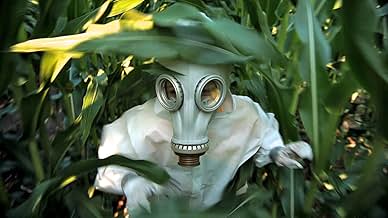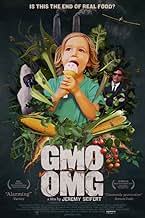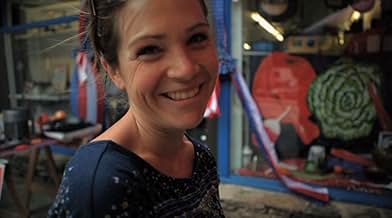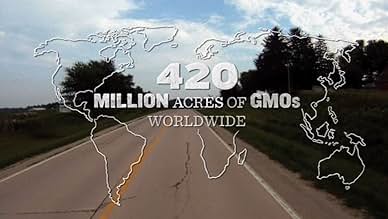GMO OMG
- 2013
- 1h 30m
Filmmaker Jeremy Seifert journeys to Haiti, Paris, Norway, and even agri-giant Monsanto in search of answers about genetically modified organisms (GMOs) and how they affect our children, the... Read allFilmmaker Jeremy Seifert journeys to Haiti, Paris, Norway, and even agri-giant Monsanto in search of answers about genetically modified organisms (GMOs) and how they affect our children, the health of our planet, and our freedom of choice.Filmmaker Jeremy Seifert journeys to Haiti, Paris, Norway, and even agri-giant Monsanto in search of answers about genetically modified organisms (GMOs) and how they affect our children, the health of our planet, and our freedom of choice.
- Awards
- 4 wins total
- Self - President, Millennium Institute
- (as Hans Herren)
- Self - Professor, University of Caen
- (as Gilles-Eric Seralini PhD)
- Self - Co-Founder, Seed Savers Exchange
- (as Diane Whealy)
Featured reviews
My soap box is: that if GMOs are so safe, then what's the big deal about labeling them? Labels give people the CHOICE to decide what they put in their bodies. (Though now labels don't really even matter because GMOs are in everything, so, moving on )
Monsanto, as any other corporate company, do not care about people, environment or the future of humans and nature. We have created the system when companies care only, but only, about own profit and never-ending profit growth for its shareholders. GMO itself does not have to be bad, but our capitalism without regulations and limits allows to exploit it in the worst possible way, killing nature and even people. Ask about BT cotton in underdeveloped countries as well, pretty interesting things are happening there!
This prompts concern for Seifert as a father and, well, a consumer, as he begins to question the contents of everything he is eating. Because the presence and use of GMOs need not be labeled on food in America, it brings question as to whether or not the common phrase of "all natural" holds any leverage. On top of that, what are the effects of GMOs on the human body in the long run? If they are safe and harmless, what's the issue in labeling them? Have we all become involuntary participants in a large, global experiment at the expense of humongous seed corporations?
Such questions are either directly or indirectly peddled by the documentary, and its big point of attack goes in the direction of Monsanto, one of the largest seed/chemical manufacturers in the world. Monsanto kickstarts a lot of farms and agriculture by forcing farmers to trade their natural seeds in order to use the exclusive Monsanto seeds. The company made headlines following the devastating earthquake in Haiti, when it sent over four-hundred tons of seeds to their community, gifting the seeds and allowing them to use them only if the country agreed to stop using their own natural seed. The Haitian community saw this as a backhanded attempt at kindness, as the natural seed holds immense importance in the country, and Monsanto's genetically-modified seed seemed far less attractive.
Seifert persists on to show the impact of Monsanto, through colorful, legible graphs, along with batting off startling statistics. For one, eighty perfect of all processed foods contain GMOs, with eight-five and ninety-one percent of corn and soy being genetically-modified as well. About one-hundred and sixty-five acres in the United States contain genetically-modified crops with about four-hundred and twenty acres housing them all over the world. One of the most alarming things presented in the film is how farms with non-GMO crops are affected negatively by those bearing GMOs. When crops are injected with special chemicals, they shed or bear the chemicals, and when the wind blows, spread the chemicals to other locations. Non-GMO farms in close proximity with GMO farms are often affected by the latter's unintentional spread of chemicals, allowing tests for the quality of the crops to become skewed, which are then met with repercussions from Monsanto's legal team.
Seifert presents all of this to us in a way that, while sometimes too hardened on statistical data, is digestible and easy to follow, especially given the fact that, judging to the beginning of the film, few know what GMOs are and where they can be found. Whether you support the use of genetically-modified organisms and see no harm in it, or find they're an abhorrent route for mankind to make an attempt to "play God," as Seifert bills it in the film, I don't see a harm in wanting to know the health effects of something found in an overwhelming majority of the foods we eat. This is part of the reason I enjoy Seifert's approach to the subject matter, as it forms a thoughtful outline and conversation.
What I didn't enjoy, however, was Seifert's rapid descent into negativity over GMOs, which seemed to happen all too quickly. From the beginning, we see a concerned father wanting to get to the bottom of what's in his food. By the half hour mark, we can see Seifert has clearly taken the pathway to being against the use of GMOs, which is fine if the film had started out by taking that stance rather than trying to travel down the middle of the road. Once Seifert starts digging into the potential harms of GMOs, he never revisits or adheres to what one thought he would in the beginning of the film, which is a fair analysis of both sides. In an age where prolific fact-checking has made every documentary at least questionably authentic, GMO OMG would've benefited from an equal examination not only for intellectual purposes but for consistency purposes as well.
Yet, it's sophomoric to dismiss GMO OMG has a film with no substance or thought-provoking questions whatsoever. Seifert gets almost philosophical and contemplative when he talks about the pervasive patenting and trademarking of seeds and wildlife that is occurring with big seed corporations like Monsanto, Du Point, and Syngenta, saying these companies are in a "race to own the building blocks of life." He questions the ethical behavior of corporations - in a way that's very popular right now - about their evasive ways to avoid questioning on the GMOs used in their products in a way that would lead any reasonable person to assume there is something to hide. The only detractor to GMO OMG is that Seifert picks a side far too easily and, in turn, compromises hope for a mostly-unbiased analysis.
Directed by: Jeremy Seifert.
You see, Big Bird is conspiring against us. I mean, Big Oil. I mean, Big Pharma. I mean, Big Agro. No, no. It really is Bid Bird. It's out to get you.
The propaganda piece that is this "documentary" documents nothing but the collective hallucinations of a sector of the first-world population.
They have never been hungry. They don't have any comprehension of what it means to be hungry, really hungry, the kind of hunger that bends you over. The kind of hunger that starts when you have eaten absolutely nothing for three or four days.
They have only seen hungry children on TV, "brown" children, always safely far, far away from them. They have never seen their own children be hungry, much less, die of hunger.
But they feel entitled to play with their food and yours. And to make ugly faces and reject this and that from their diet because of their political beliefs. They are picky. They are also entitled to criminalize other people's diets and to fabricate stories about food they don't approve of. They are also entitled to forbid you from eating it.
There is no information in this documentary. You will only learn about a delusion. A delusion, by the way, that is killing millions of people every year. Look up vitamin A deficiencies, for example. It's perverse. You and I can protect ourselves from these people. The poor of the world can't.
Did you know
- Quotes
Dennis Kucinich: GMO - Organisms in which the genetic material DNA has been altered in a way that does not occur naturally. 2 basic types of GMOS: Pesticide producers and Herbicide Resisters. PP kills insects like Monsanto's BT Corn, a gene from a naturally occurring bacteria is inserted into the DNA of corn. The modified corn releases a toxin that kills insects. Herbicide Resisters are immune to weed killer, like round up ready. The herbicide is inserted into the plant DNA to make it resistant to round up. The very beginnings of agriculture started 10,000 years ago. Around 900AD, the chinese started using arsenic sulfides in their planting. In 1945, 200 million pounds of pesticides were used. By 2000, it was 5.1 billion pounds of pesticides. Now over 500 species of bugs are resistant to pesticides. After 30 years of side by side comparisons b/n organic and chemical agriculture, the rod ale farming systems trial proved that organic yields match conventional yields. Organic corn yields were 31% higher than convention in years of drought. Conventional systems emit nearly 40% more greenhouse gases per pound of crop produces that the organic systems. Organic fields increase groundwater recharge and reduce runoff. 60 countries require the labeling of GMOS, and we can't even get 1 single state due to Monsanto. 6 million people in California voted for prop 37 to label GMOs but the industry paid 45 million dollars to make sure it wouldn't pass. in 1992 under heavy pressure from the biotech industry, the FDA declared that GMOs were generally recognized as safe. GRASS. There's something extremely wrong when the government becomes captive to a single industry and pushes non-renewal, debt creating seeds that destroy bio diversity. The biotech industry spent $547.5 million lobbying congress from 1999-2009. Over 300 former congressional and White House Staff members are now employed by Biotech firms as lobbyists. Gates Foundation purchases 500,000 Monsanto Shares, Monsanto and Walmart team up to feel GMO sweet corn. Wikileaks cables reveal state dept. promoting GMOs abroad. 2 Studies point to common pesticide as a culprit in declining bee colonies. On India's farms, plague of suicide and they're citing Monsanto. US Discovery of rogue GMO wheat raises concerns over controls. GMOs are a form of slavery.
- ConnectionsReferenced in Listen Up Philip (2014)
- How long is GMO OMG?Powered by Alexa
Details
Box office
- Gross US & Canada
- $47,558
- Opening weekend US & Canada
- $15,100
- Sep 15, 2013
- Gross worldwide
- $47,558
- Runtime1 hour 30 minutes
- Color
Contribute to this page

























